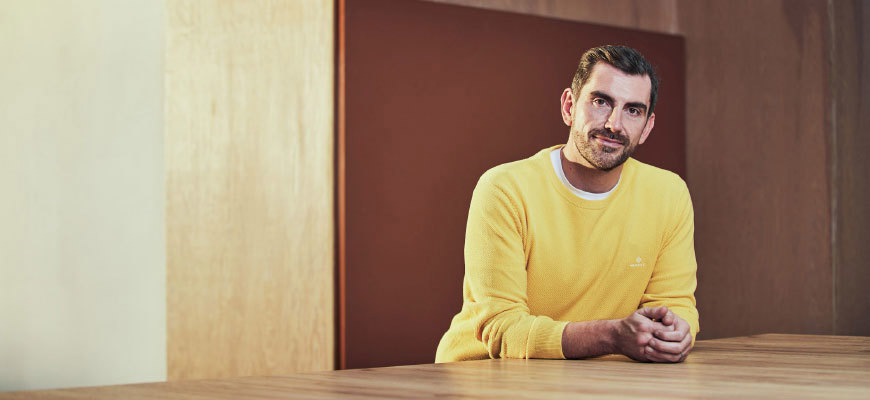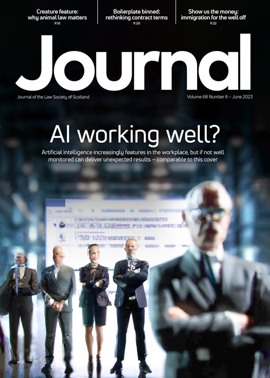In-house: Scanning wider horizons

In-house lawyers occupy a unique position in their workplace. On the one hand, they operate as skilled advisers, able in a way that external advisers can rarely become, familiar with the wider business context. On the other, they can also be more strategic contributors, bringing to the table transferable skills such as critical thinking, innovative approaches and project management.
The ease with which this complementary role can be developed varies with the culture of a company. In a young innovative startup there can often be more scope. In established businesses it can be more difficult to make that jump to C-suite/general counsel roles. This month we focus on an in-house role that has from the start been one which blends these two elements.
Skyscanner is a global travel metasearch platform, founded in Edinburgh in 2003, with offices across the UK, Europe, North America and APAC, and around 1,400 employees. Its website regularly records on average 100 million travellers every month searching for cheap flights, hotels and car hire, and has access to a bank of 80 billion prices every day from its network of over 1,200 partners.
Here Catherine Corr, of the In-house Lawyers’ Committee, speaks with Martin Nolan, to gain some insight into what it is like working within such an environment as general counsel.
Tell us about your career path to date?
I trained with Shepherd and Wedderburn, in Edinburgh and London, then, when I qualified, I moved to Dundas & Wilson in Glasgow, beginning life as a corporate finance lawyer. After a few years, I returned east to Burness Paull for a few years, before moving in-house in 2016.
I joined Skyscanner in 2017 and have been fortunate to progress within the business.
I became general counsel in 2021, so now look after legal, public affairs, risk and sustainability globally, helping drive the best outcomes for the 100 million people who use our product every month. This means that I also sit on Skyscanner’s executive team and help manage the overall business direction.
What was your previous role and job title?
My last role was as general counsel of a tech startup. I was the only lawyer, but also covered HR and some sales/product development issues. And regularly emptied the dishwasher…
What was your main driver for working with Skyscanner?
The opportunity was just incredible – it’s such a dynamic company, but culturally, for me, it instantly felt like home. It gave me scope to build a team and diversify areas of responsibility, such as building our public affairs team. It also let me travel the world.
Does the GC role go hand in hand with the risk and compliance function, or do you wear two different hats for your organisation?
I wear both hats, but even if they’re separate functions, I think they go hand in hand. It’s impossible to manage risk and compliance successfully if there isn’t a symbiotic relationship between them. Those functions being well connected (or all under one roof) makes it much more efficient and reduces risk.
Would you encourage young lawyers to consider a career in-house?
I’d absolutely recommend that: it’s a great chance to get much closer to the commercial element of businesses. In corporate finance I loved the transactional side of things, but realised I loved understanding the key issues affecting my clients and particularly being in a consumer-facing business.
Moving in-house allows you to deepen that understanding, which you can then use to better advise your client because you’re intimately connected to purposes and goals, strategy and risk appetite. Also, moving in-house for a while does not preclude a return to private practice.
What advice would you give lawyers who want to start a career in-house? What makes a good in-house lawyer?
For those who are already in private practice, try to find an opportunity to go on secondment and see if you like it. For me, it’s really important that I see people wanting to join us because they’re genuinely interested in the business and sector we work in – it’s not about escaping time recording and having more regular hours. It’s also not the case that certain private practice specialisms preclude a move in-house – a candidate with the right enthusiasm and attitude will still be able to make the move, regardless of background.
Our lawyers all need to demonstrate that they’re able to focus on commercial outcomes, and have a strong ability to prioritise and re-prioritise, and to make risk-based decisions.
I also especially look out for lawyers who take ownership of issues, who are looking round corners for problems and proactively solving them.
How does the future look for in-house lawyers? What are the key challenges and opportunities?
I think in-house teams will (to the extent they haven’t already) really work hard to look at the impact of AI and automation, the time that can free up, and the extra value that can be added with that time.
Demonstrating value to businesses is essential for all functions, legal included. But these developments will likely bring more rewarding and diverse in-house careers.
What are the current hot topics in your sector?
There is a huge influx of regulation of the tech (and travel tech) sector, particularly on the impact and behaviours of so-called gatekeeper platforms. The use of AI and machine learning is also on everyone’s minds. As a global business, geopolitical tensions are also something we are always monitoring.
How have attitudes and working practices in the legal profession changed in the law since you started out?
I think there’s much more flexibility and trust now, but equally more junior lawyers are better about being vocal on their career aspirations. There is also a greater focus on wellbeing and on building a diverse team, which was not really the case when I was starting out.
I qualified in 2008 and wellbeing certainly wasn’t on anyone’s mind at that point. While there’s still lots more to do, the legal profession is now recognised as a leader in the diversity, equality and inclusion space, which I wouldn’t have imagined 20 years ago when I was applying for traineeships.
How can solicitors build good mental health, increase resilience and manage stress successfully?
I think the answer to that depends very much on the individual, but in most cases, talking about what’s on your mind, being open and honest with yourself, and confiding in people you trust will help. It’s also really important to take time out for yourself and do something you enjoy.
Having some time away from your desk and your phone/messages every day is really helpful to give some headspace. For me, a really helpful thing is to build breaks into my diary, so that I don’t find myself on nine hours of consecutive Zoom meetings.
Lawyers aren’t generally seen as being particularly innovative. Would you agree? What have you done in any of your roles that’s been innovative or resulted in process improvements for your team or organisation?
I wouldn’t say inherently that lawyers aren’t innovative, but often they’re not great at showcasing the innovation they have the potential to bring. Sometimes it’s because they don’t allow themselves enough space to take a step back and reflect on where improvements can be made, or to research what innovative changes they may be able to make.
I’d always love to do more in this area, but what we have managed to do at Skyscanner is introduce fully self-service contract creation and management. This means that where any agreement – from NDAs to employment or partner contracts – is on our templates, or not substantively amended, our lawyers never have to review them. It also places the end users in control of timing, which they prefer. That’s saved lots of time for everyone and delivered much stronger governance across our contract management.
What is your most unusual/amusing work experience?
There are quite a few, but most of them can’t be put into print.
We once had to advise on how a potential employee we were planning on bringing to Scotland from Spain could bring their pet pig to the UK. The pig shall remain nameless, but sadly we were unable to circumvent the rules on livestock to keep the person happy, so they didn’t join us.
What do you love about your role, and what do you love doing when the working day is done?
The variety of things I work across and the degree to which I can take ownership is one of the best elements. I’ve really enjoyed building out the public affairs function and spending time in Brussels and Washington, lobbying for the interests of our travellers. At one point I got to address the European Parliament, with my speech being live-translated into all the languages of the EU – that was possibly a career high and not something I would ever have imagined doing when I was in private practice.
Virtually everything I work on has a really clear purpose (which is why I love being in a consumer-facing business). Moving to sit on the executive team was a real change for me, as I’m less involved in the elements of the functions I’m responsible for than I was previously, with more of a focus on broader management and culture, which is challenging but really interesting.
When the working day is done, I’m ready to turn my brain off as much as possible, so it’s nearly always curling up on the sofa with my dog and husband (in that order) and binge watching something on TV.
Finally, a few fun quick fire ones:
Rise and shine or lie in? Lie in, 100%.
Dinner party – host or guest? Six top guests? Host. I know it’s customary to say the Dalai Lama and other icons, and I’m sure that would be interesting, but top of my list are Alan Carr, Gemma Collins, Barack Obama, Ryan Reynolds, Donald J Trump and Meghan Markle.
Best advice you have ever been given? Be yourself. Better to be disliked for who you are than disliked for who you are trying to be.
Perspectives
Features
Briefings
- Criminal court: Dangerous or careless?
- Corporate: Bill gives CMA consumer enforcement powers
- Agriculture: A question for the Land Court?
- Intellectual property: Who owns AI generated copyright?
- Succession: Variation by an attorney?
- Sport: Participation in LIV Golf ruled out of bounds
- Scottish Solicitors' Discipline Tribunal: June 2023
- Data protection: Meta's mega matter
- In-house: Scanning wider horizons






